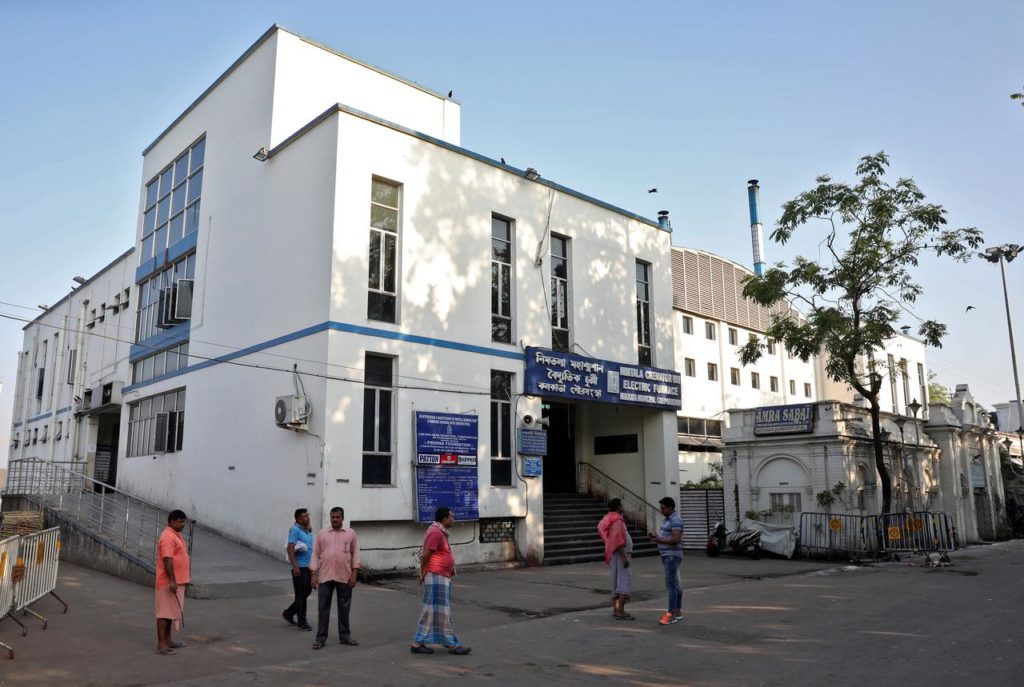Vitriol & Violence: A Covid-19 Death Exposes Paranoia
Mar 30, 2020 | Pratirodh Bureau
People stand outside Nimtala Crematorium, where a coronavirus positive patient Samir Kumar Mitra was cremated on March 23, in Kolkata
When Satyaki Mitra’s father developed a mild fever in mid-March, the graduate student in Philadelphia wasn’t especially worried. He told his 57-year-old father, living in the eastern Indian city of Kolkata, to get tested for the new coronavirus.
The initial test came back negative, but Samir Kumar Mitra’s condition steadily worsened.
On Monday, two days after testing positive for the virus, Samir died, plunging his family into grief and triggering a public backlash that has left his 27-year-old son stunned.
On a Kolkata street, crowds battled with police for hours to stop Samir’s cremation, fearing it would spread the coronavirus and endanger lives.
On Facebook, users left abusive messages on Samir’s account, accusing him of meeting with Satyaki and his American wife and bringing the deadly virus to Kolkata, a sprawling city of 4.5 million people.
The case underscores how vitriol and disinformation can fan paranoia and even violence in a country already reeling from the worst communal riots in years between Muslims and Hindus – partly whipped up by fake news.
That risks complicating the government’s efforts to manage the unfolding crisis in the nation of 1.3 billion people.
The entire population is under a 21-day lockdown and so far the number of cases and deaths related to the coronavirus have been small compared with many other large countries.
But experts and some officials are concerned they could spike.
Satyaki and his wife have been targeted on social media, he said, and his mother and grandmothers took shelter at a hospital because they were too scared to return to their home.
“I can’t understand how people can be so hateful,” Satyaki told Reuters from the United States. He was unable to return for his father’s last rites, as restrictions in the wake of the pandemic made the journey impossible.
LISTS CIRCULATE ONLINE
On March 20, India’s federal government issued an advisory to social media companies to clamp down on the circulation of false information and unverified data on the outbreak, and deployed its own officials to debunk fake news.
Two independent Indian fact-checkers told Reuters they had seen a sharp increase in misinformation and fake news on the coronavirus across platforms since the outbreak was first detected in India.
Rajneil Kamath, publisher of Newschecker, said the increase mirrored misinformation typically seen during major political events, including a flood of queries in regional Indian languages.
“Everybody is just forwarding things and asking: is this true?” he said.
People are also using online platforms to identify those who have recently returned from locations considered high-risk or who may have come into contact with people with the disease.
Authorities in the southern state of Karnataka posted lists of quarantined people across several districts online, which were shared on local WhatsApp groups.
The lists, complete with addresses, have been used to create at least one website where users can put in their zip code to check if anyone is quarantined nearby.
In response to questions from Reuters, WhatsApp and Facebook said they were working to connect people directly with public health officials.
As of Saturday evening, India had 909 confirmed cases of the coronavirus. Samir was the first confirmed coronavirus patient to die in the state of West Bengal, and one of 19 killed by the disease so far in India.
Indian health authorities have said the virus remains largely restricted to those who travelled to affected areas and others who came into direct contact with them, but experts have warned the spread may be wider.
According to one projection, more than 100,000 Indians could be infected with the disease by mid-May, putting India’s creaky health system under severe strain.
